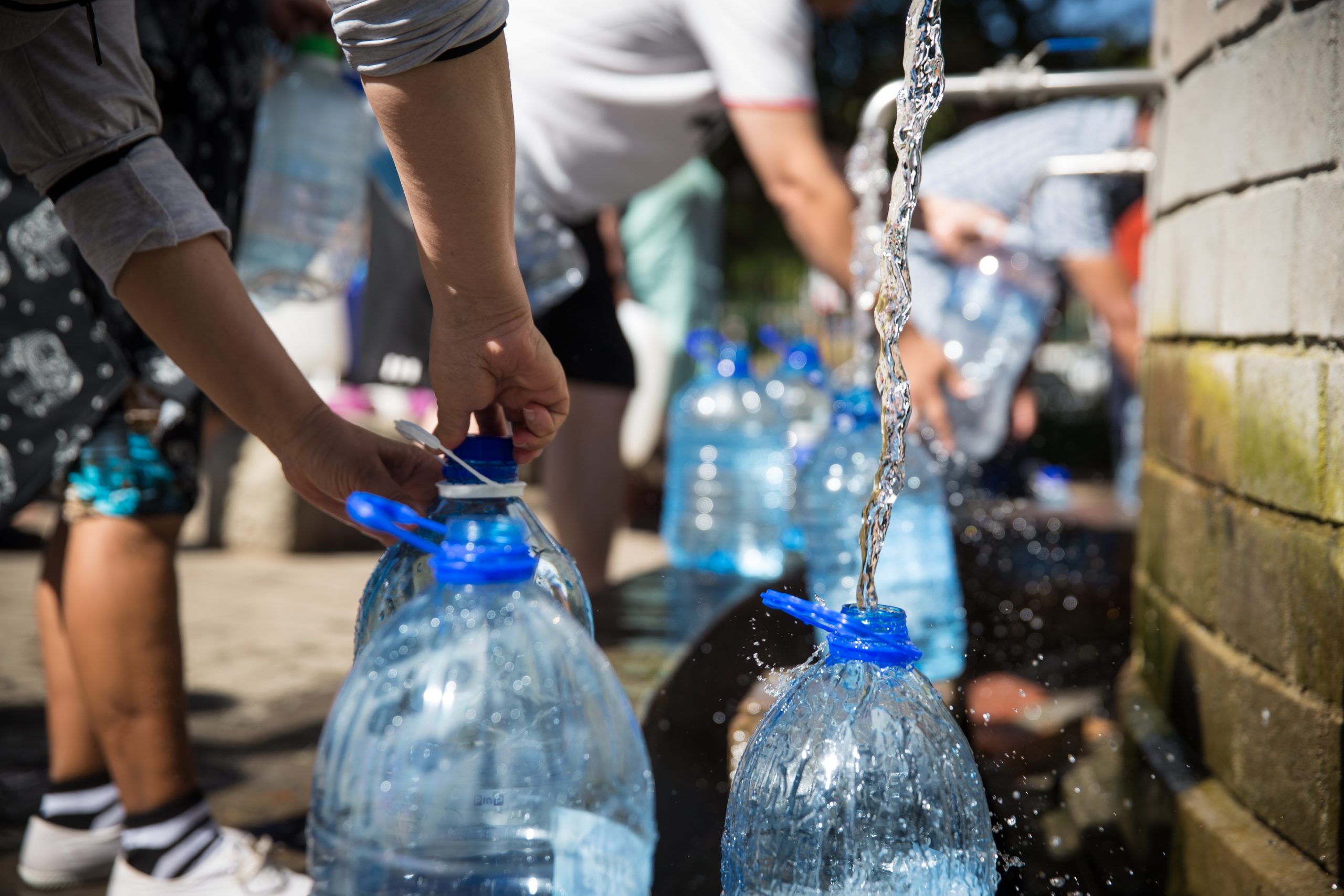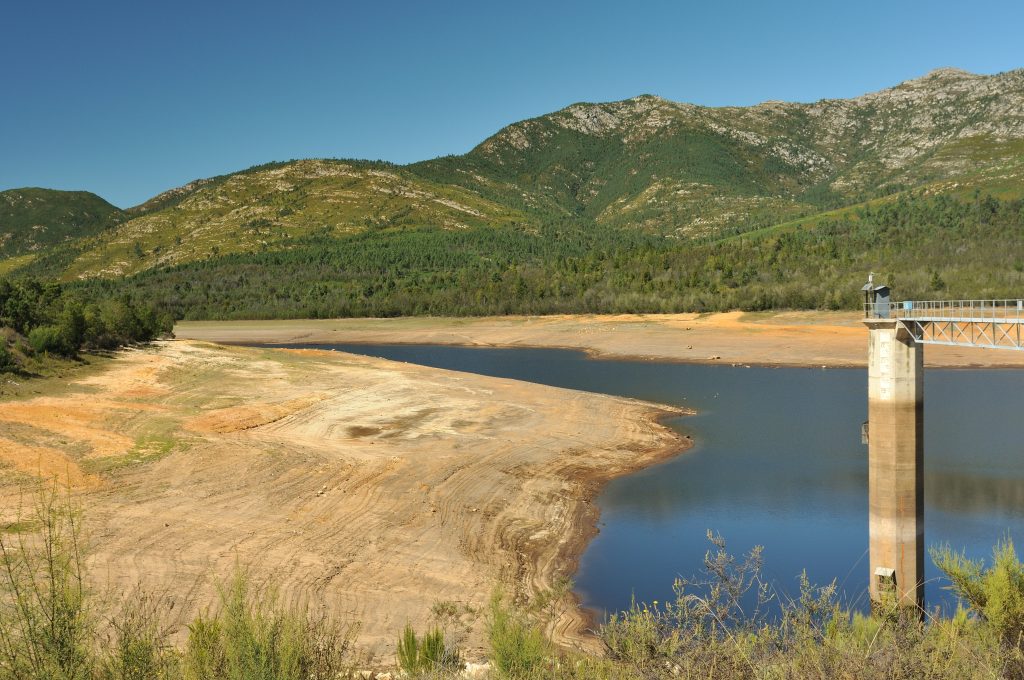News
Inspiring a whole-of-society mindset shift on water

Comment | Mar 2024
For World Water Day, Head of Nature-based Solutions Dr Najma Mohamed explains how nature-based solutions and a rights-based approach to climate and environment policy and practice is the best route to leveraging water for peace
Johannesburg is currently confronting an unprecedented water crisis, affecting those living in informal settlements as well as those in more affluent suburbs. In recent weeks, thousands of people in South Africa’s largest city and economic hub have had to line up to collect water delivered by municipal tanker trucks, with taps running dry as a heatwave and crumbling infrastructure deplete the city’s reservoirs.
The news reports bring back visceral memories of 2018, when my home city of Cape Town almost ran out of water. Working in Pretoria at the time, I along with millions of other people around the world was transfixed as the city prepared for ‘Day Zero’: the day when the reservoirs would be empty and the taps would run dry for the population of almost five million.
To my immense relief, Day Zero was not reached, largely thanks to the sacrifice and hard work of Cape Town’s inhabitants. Using water to maintain lush public parks, golf courses and swimming pools was banned; water was trucked in from other parts of the country; infrastructure reform was accelerated, including systems to supply recycled as well as standard drinking water to properties; and residents were limited to a daily allowance of 11 gallons (50 litres), necessitating a range of personal water-saving measures – from grilling food instead of boiling it, to reusing the wastewater from washing up, washing machines, showers and baths. This was a demonstration of governance, finance and policy working together with behaviour change on the ground by citizens, business and civil society. But Day Zero has not disappeared, merely been delayed – as the current situation in Johannesburg reminds us.
South Africa is a semi-arid country. Among the climate change impacts the country will likely face is a decrease in rainfall. Water stress is a priority problem across the country, caused by excessive use, growing demand, pollution, inadequate infrastructure, poor practices and unequal access to water. Now adding to these problems is climate change. Without a fundamental shift in the way South Africa thinks about water and a massive USD 60 billion investment, the country will run out of water by 2030.

The memory of 2018, and the inequality the problem of Day Zero made stark, is fresh in my mind today, World Water Day, in light of the theme, “Leveraging Water for Peace”.
Water can be a trigger, weapon and a casualty of conflict and instability. The civil war that began in 2003 in Darfur, western Sudan, has been called the first climate change conflict, as a decades-long surge in droughts exacerbated ethnic tensions. From 2006 to 2010, Syria suffered its worst drought in modern history. The combined effects of the drought and pre-existing economic disparities under the Assad regime contributed to the first nonviolent pro-reform protests in 2011, riding the wave of Arab Spring uprisings.
Today, wars in the Middle East, Ukraine and Sudan are wrecking lives, livelihoods and the natural life support systems we all depend on. For months in already water-stressed Gaza, a humanitarian crisis has unfolded as water infrastructure is destroyed, and piped supplies halted, leaving more than a million people without clean drinking water.
At the same time, the warming El Niño climate pattern is continuing well into 2024, bringing further disruption to the water cycle: heatwaves, droughts, wildfires and heavy rains and floods are likely to be worse in some regions.
We know that tensions can rise between communities and countries when water is scarce or polluted, or when people have unequal or no access. As the impacts of climate change grow, UN Water has said there is an urgent need, within and between nations, to unite around protecting and conserving our most precious resource.
So how do we leverage the existential threat that rising water scarcity poses to achieve lasting peace and security, and ensure the preservation of hard-won human rights?
In the climate movement, ‘justice’ and solidarity are becoming visible, and the application of human rights, equity, non-discrimination, equal participation, accountability and access to justice is now central to the climate conversation. This was the context in which my own environmental story started, amid political and democratic renewal in South Africa, where the adoption of a rights-based approach to climate and environment policy and practice was the route to addressing interconnected challenges.
Nature-based Solutions: Promoting a rights-based approach to the water crisis
In the years since it narrowly avoided Day Zero in 2018, the city of Cape Town, working with non-governmental organisations and local people and businesses, has demonstrated the efficacy of inclusive, innovative nature-based solutions (NbS): actions and approaches that work with nature to address a range of social, economic and environmental challenges – including climate change.
As of October last year, the removal of 46,000 hectares of invasive acacia, pine and eucalyptus trees from the water catchment area of the city’s dams had restored about 15.2 billion litres of water a year to the water system. This work created more than 700 jobs, nearly half of which were held by women, as well as bringing benefits for native flora and fauna, soil ecology and ecosystem function. This reinforces the findings of broader research, which UNEP-WCMC contributed to, that if stakeholders from across society work together on NbS, it is possible to neutralise some of the worst impacts of droughts, floods and other extreme weather events.
The NbS team I lead at UNEP-WCMC supports national and institutional partners to take on board NbS to tackle drought and desertification, and pursue a coherent approach on implementation of the Paris Agreement on climate change, the Kunming-Montreal Global Biodiversity Framework and the UN Convention to Combat Desertification.
Alongside our work in support of the Rio conventions, our team advances understanding of NbS for drought resilience through multiple projects. As part of the EU Horizon 2020 Rexus Project, UNEP-WCMC researchers are working alongside a consortium of 17 scientific institutions and partners to generate evidence to strengthen business cases for NbS as a way to deliver water, food and energy security in five drought-prone regions of Europe. We are leading a component of the Rexus project’s work on assessing and incorporating NbS to water-energy-food-ecosystem planning and adaptation, with the aim of developing a decision support tool to demonstrate various advantages and returns on investment from NbS.
This year, we are testing the use of the tool at upcoming stakeholder workshops, including pilots in the Lower Danube and Spain. Through these, we aim to assess the both the technical and socio-economic effectiveness of different solutions, as well as identifying opportunities and barriers to their implementation.
UNEP-WCMC’s teams also work on a diverse range of other projects helping countries and the private sector understand water usage and sustainability. These include assessing the impact of ecosystem-based adaptation initiatives on communities in specific contexts and creating tools to navigate ecosystem-based adaptation measures. ENCORE, a tool developed by UNEP-WCMC, helps financial institutions and companies assess their water use and dependencies. We provided input into the Taskforce on Nature-related Financial Disclosures framework launched last year, setting out how businesses and financial institutions around the world can assess and report on their relationship with nature. We also develop in-country projects, working closely with governments, researchers and communities to help transform national economies.
Through this approach, we hope, as the people of Cape Town demonstrated is possible, to inspire a whole-of-society change in mindset to how societies think about and value water.
Main image: AdobeStock_396724905
Have a query?
Contact us
communications@unep-wcmc.org
